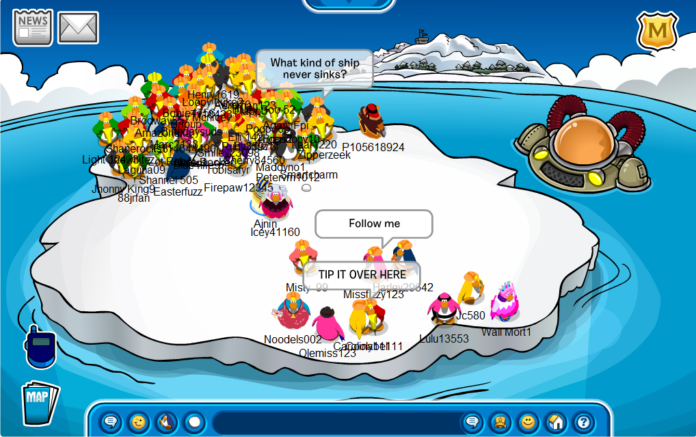Club Penguin established the social foundation on which the social, multiplayer games of today are built
We’re living in the era of the digital world as an always online, dominant social space. Intimate moments are shared through an iMessage or DM. Close friends can be made through random matchmaking in a standard game of “Fortnite.” Our video games are as social a space as any gathering or party. Video games are now more than just games — they’re a place where players can socialize in the digital world.
Games like “Fortnite” and “Destiny” are not just battle royales or looter shooters — they are places where friends, new and old, can come together, hang out and chat, like they would in the traditional sense. And the predecessor to the success of these games as a place for socializing was “Club Penguin.”
A lot of people tend to think of gaming as an isolating, lonely experience. But, if “Club Penguin” taught us (and game developers) anything, it is that meaningful socialization is just as possible in the online gaming world as well.
“Club Penguin” paved the way for games as a space for a generation of players. It gave friends a sense of community that they could bring home with them and into the online world. “Club Penguin” is a great indicator of the ability of digital games and worlds to extend social connections for kids beyond the playground.
Developed by New Horizon Entertainment, “Club Penguin” allowed kids from any background to be whatever penguin they wanted –– without worrying about traditional social anxieties, the clothes they wore or what they looked like. It is the defining theme of multiplayer games as a whole — you can be whoever you want — and it welcomed a generation of people into the brilliance and level playing field that virtual worlds can provide.
What separated “Club Penguin” from other online social platforms was that it was a completely ad-free and safe online space for kids to hang out. The game was able to run on almost all computers, new or old. More importantly, it was free. The game was built for success.
At its peak, “Club Penguin” encompassed more than 200 million penguins (accounts) across 190 countries. That’s over half of the population of the United States and more than the total amount of Netflix users.
The paid membership model used by “Club Penguin” introduced a generation of players to the concept of monthly or annual passes. Offering cosmetics and various other player enhancements, New Horizon Interactive (later known as Disney Canada) made subscriptions a new option for free-to-play games — something we see so often in games like “Fortnite” today.
The problem with games today — like “Club Penguin” — is the cosmetic hierarchy that is established with the purchase of a monthly subscription, also known as “battle passes.” And so, in this escape from the pressures of reality a new class system was born and a stark divide was — again — struck between the virtually rich and everyone else. I can vividly remember the introduction of puffles, new color schemes, igloo upgrades and overpowered Card-Jitsu cards. And the reaction I shared with my online friends was largely the same: “These stupid subscriber rich kids are paying to win!”
Our experience with “Club Penguin” did not have to do with fancy cosmetics. Instead, it had always been just a place to hang out and make new online friends — which is the fundamental part of any great online game.
“Club Penguin” was a space where my friends and I could grow up together. It was a place where I spent multiple New Year’s Eves sliding on tubes and throwing snowballs at strangers. It was a place where you could try to push the limits of swear-censoring until you got banned and had to switch to a backup account. And it dominated conversations on the playground at school, the same way “Fortnite” does today.
For me, “Club Penguin” was the social media before social media. It was a social media without incessant advertisements, data harvesting, or social pressures. It felt like an infinitely vast world where players could just make a candy pizza. It was a remarkable place throughout its lifetime, and it paved the way for massive hits like “Fortnite” and “Minecraft” to find success because of the social space they provide.
When “Club Penguin” was shut down in 2017, the final words on the screen perfectly encapsulated the experience of online gaming:
“Together, we can build an island, create a community, change the world . . . even tip an iceberg. Waddle on.”
Written by: Calvin Coffee — cscoffee@ucdavis.edu
Disclaimer: The views and opinions expressed by individual columnists belong to the columnists alone and do not necessarily indicate the views and opinions held by The California Aggie.










